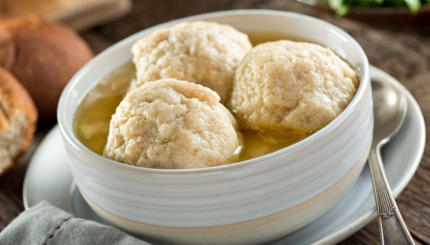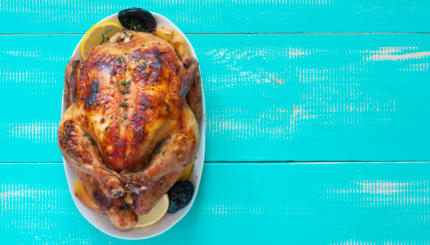I last ate meat 25 years ago, but I am not a vegetarian.
Vegetarianism as a Way to Keep Kosher
When I came home from Camp Ramah as an enthusiastic 12 year old, I informed my parents that I wanted to keep kosher. After some initial struggles, I chose being a vegetarian as an easy way to bypass the issues of forbidden species, kosher shechitah (slaughtering), and the prohibited combination of meat and milk. I continued to eat the permitted species of fish. When I went back to camp, I maintained my vegetarian diet; I thought the transition back and forth from eating meat to not eating meat would be too difficult.
Is Vegetarianism Even More Kosher?
But then I picked up a copy of Louis Berman’s Vegetarianism and the Jewish Tradition. Berman argued that vegetarianism was part and parcel of Jewish tradition. He argued that the desire for meat was a craving and that kashrut was a way to atone for eating meat. Jews had slaughtered animals in worship, but that was also a passing phase in Israelite development, a “bone” thrown to a primitive culture. He argued that “the gap between human and animal life seems very small indeed.”
Berman’s work provided a philosophical context for my choice. I began to think like a vegetarian. For a short period of time, I had qualms about the leather tefillin I wore while praying in the morning. More significantly, I began to see vegetarianism as an ideal. Judaism was working towards moral perfection, and eating meat just could not be part of that. During my last year of high school, I stopped eating even kosher fish.
Learning the Lesson I Was Teaching
But something happened that radically changed my perspective. I went back to camp as a counselor and found myself actively engaged in the informal education of young Jewish teens. As I prepared discussion and programming materials for our Shabbat program on the theme of kashrut, I was confronted with my own practice and the need to teach these campers about kashrut, not vegetarianism. Ultimately, I presented vegetarianism as an option for kids who, like me, wanted to “keep kosher” in a non-kosher home. I would not, could not present vegetarianism as an ideal. As a Jewish educator, I had to ask myself: who was I to say that although kosher was good, “veggie” was better?
Berman did argue that vegetarianism was the ideal, both in Eden and in the prophetic vision of the future. But as I see it, the road back to Eden is blocked; God permitted meat to all the descendants of Noah.
Vegetarian is Simply Not a Jewish Category
In my eyes, “vegetarian” is not a Jewish category, no matter how many eminent Jewish vegetarians could be identified. Having read Louis Berman’s work and having interacted with many ardent vegetarians, I am convinced that vegetarianism is, at its core, an ideology that equates animal life to human life–a stance that is hard to reconcile with Judaism’s emphasis on the supreme value of human life.
I am a non-meat-eating non-vegetarian. I guess one could call me “veggie-prax”–a vegetarian in practice, but not by ideology. I usually attribute my continued choice to avoid eating meat to “emotional reasons.” I have always been glad when my family has had the opportunity to eat meat. For most of my adult life, I have treated my choice to avoid meat as a private eccentricity.
Questioning Meat-Eating on Other Grounds
I have, however, become less insistent about my support for (other people) eating meat. A few years ago, I had several students who were vegetarians, and two were militantly so. As their Talmud teacher, I was concerned that they understood their own practice in Jewish terms. So I re-examined the Jewish arguments for vegetarianism. Most importantly, I reread Richard Schwartz’s Judaism and Vegetarianism and his Judaism and Global Survival.
Schwartz’s arguments did strike me as authentically Jewish. Rather than focus on animal rights, Schwartz focuses on human, and Jewish, responsibilities. Schwartz emphasizes classical Jewish concerns and their practical implementations. Current methods for raising animals do violate Jewish ethics about tza’ar ba’alei hayyim, the suffering of animals. Diets rich in meat products endanger health, and we are commanded v’nishmartem me’od, to be very careful with our health (Deuteronomy 4:6).
Grasping at huge amounts of grain in order to feed animals for slaughter diverts needed food resources from the world’s hungry and violates the obligation of pato’ach tiftach, opening our hands to the needy. And the environmental degradation due to a meat-eating consumer culture threatens the health of our environment and ignores God’s command l’ovdah ul’shomrah (Genesis 2:15), to preserve and work the land properly. Our focus must be on stewardship and responsibility.
Is Veal Treyf?
As an educator, I think the terminology we use is very important. For instance, some Jews (including rabbis) have begun to call veal “treyf” (not kosher) because of the horrendous conditions which the animals experience during commercial veal production. While I am not sure whether the treatment of calves is qualitatively worse than the treatment of other animals in industrial farming, I am sure that these animals (if slaughtered properly) are not “treyf.”
If we are to protest the treatment of these animals by not eating them, then we should call the animals “pasul” (invalid) or simply “asur” (forbidden) because of the violation of tza’ar ba’alei hayyim. Calling veal treyf is a simplification and an obfuscation akin to explaining one’s commitment to kashrut by claiming to be a vegetarian. Not eating veal because one says it is treyf will not change commercial veal production, but prohibiting it explicitly because of the cruelty involved just might.
Eating Meat Would be OK If…
If meat were produced in a sustainable way without cruelty, with minimal impact on the environment and without diverting significant resources from feeding the poor, and if it were consumed in smaller, healthier portions, then I would be all for eating meat. But this is not yet the situation, and I still do not eat meat. Consider me machmir (strict) regarding Jewish obligations to have compassion for animals, prevent hunger, preserve the earth, and avoid unhealthy behaviors. But don’t call me a vegetarian.
kashrut
Pronounced: kahsh-ROOT, Origin: Hebrew, the Jewish dietary laws.
kosher
Pronounced: KOH-sher, Origin: Hebrew, adhering to kashrut, the traditional Jewish dietary laws.
Shabbat
Pronounced: shuh-BAHT or shah-BAHT, Origin: Hebrew, the Sabbath, from sundown Friday to sundown Saturday.
Talmud
Pronounced: TALL-mud, Origin: Hebrew, the set of teachings and commentaries on the Torah that form the basis for Jewish law. Comprised of the Mishnah and the Gemara, it contains the opinions of thousands of rabbis from different periods in Jewish history.
tefillin
Pronounced: tuh-FILL-in (short i in both fill and in), Origin: Hebrew, phylacteries. These are the small boxes containing the words of the Shema that are traditionally wrapped around one’s head and arm during morning prayers.
treyf
Pronounced: TRAYF, Origin: Yiddish, not kosher



